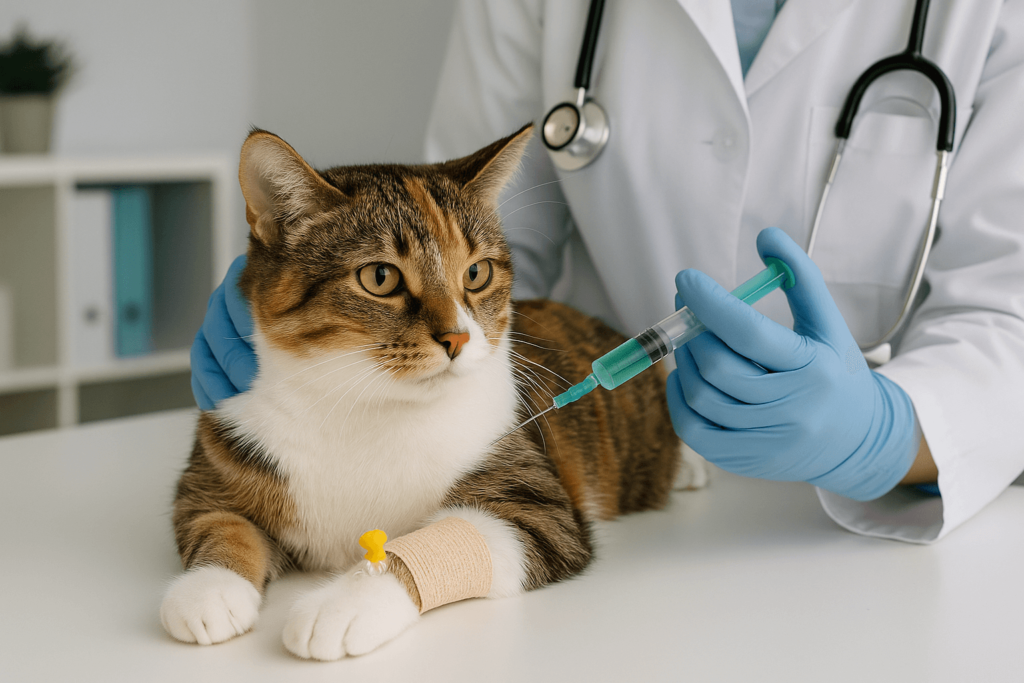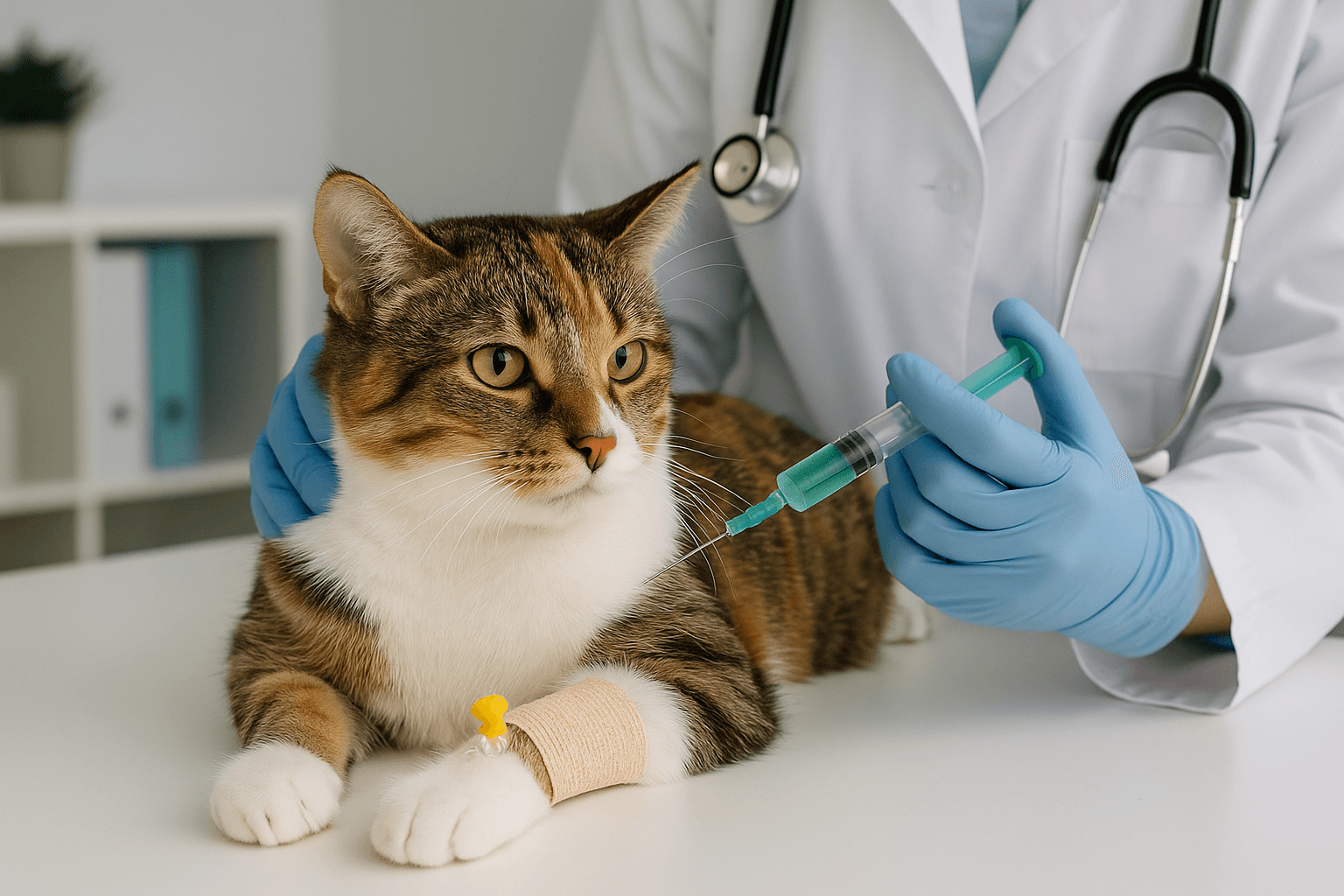Understanding Cat Cancer Treatment: A Guide for Pet Owners
Cancer is a devastating diagnosis, not only for humans but also for our beloved feline companions. As cats live longer due to advancements in veterinary care, the incidence of cancer has become more common. While hearing the word “cancer” can be overwhelming, understanding the treatment options available can empower pet owners to make informed decisions. From early detection to modern therapies, this guide explores everything you need to know about cat cancer treatment. By staying informed and proactive, you can provide your furry friend with the best possible care during this challenging time.
Common Types of Cancer in Cats
Cancer in cats can manifest in various forms, each requiring specific diagnostic and treatment approaches. Familiarizing yourself with these types can help you recognize symptoms early and seek timely veterinary care.
Lymphoma:
This is one of the most common cancers in cats, often affecting the digestive tract or lymph nodes. It may be linked to feline leukemia virus (FeLV).Squamous Cell Carcinoma:
Typically found in the mouth or on the skin, this cancer is aggressive and requires prompt treatment to prevent spreading.Mammary Tumors:
Female cats that are not spayed are at higher risk for mammary tumors, which can be benign or malignant. Early spaying significantly reduces this risk.Fibrosarcoma:
Often associated with injection sites, this cancer forms in connective tissue and can grow rapidly if untreated.Adenocarcinoma:
Commonly found in the lungs or gastrointestinal tract, this cancer type requires specialized imaging for accurate diagnosis.
Recognizing these common cancers allows pet owners to monitor their cats closely and advocate for comprehensive veterinary evaluations when necessary.

Treatment Options for Feline Cancer
When it comes to treating cancer in cats, there are several options available, depending on the type and stage of the disease. Understanding these treatments helps ensure your cat receives the most appropriate care.
Surgery:
Surgical removal of tumors is often the first line of treatment for localized cancers, such as fibrosarcoma or mammary tumors.Chemotherapy:
Chemotherapy targets fast-growing cancer cells and is commonly used for systemic cancers like lymphoma. It’s tailored to minimize side effects in cats.Radiation Therapy:
Radiation therapy uses high-energy beams to shrink tumors and is effective for cancers that cannot be fully removed surgically.Palliative Care:
For advanced cases where curative treatment isn’t possible, palliative care focuses on improving quality of life through pain management and supportive therapies.Immunotherapy:
Emerging treatments aim to boost the immune system’s ability to fight cancer, offering hope for future advancements in feline oncology.
Each treatment option has its benefits and limitations, and your veterinarian will help determine the best course of action based on your cat’s unique needs.
Check this guide 👉Understanding Cat Cancer Survival Rates: Best 7 Expert Tips!
Check this guide 👉Understanding Cat Paw Cancer: Best 7 Expert Tips!
Check this guide 👉Understanding Cat Nose Cancer: Best 7 Expert Tips!
Preventive Measures for Cat Cancer | Signs Your Cat May Have Cancer |
|---|---|
Spay or neuter your cat early | Unexplained weight loss |
Maintain a healthy diet | Persistent sores or lumps |
Schedule regular vet check-ups | Difficulty eating or swallowing |
Avoid exposure to cigarette smoke | Lethargy or changes in behavior |
Provide a stress-free environment | Abnormal bleeding or discharge |
How to Support Your Cat During Cancer Treatment
Caring for a cat undergoing cancer treatment requires patience, compassion, and practical adjustments to their daily routine. Here are some ways to support your feline companion through this journey.
Provide Nutritious Meals:
High-quality, easily digestible food ensures your cat maintains strength and energy during treatment. Consult your vet for dietary recommendations.Create a Comfortable Space:
Designate a quiet, cozy area where your cat can rest and recover without disturbances. Include familiar bedding and toys.Monitor Side Effects:
Keep an eye on potential side effects from treatments, such as nausea or fatigue, and report them promptly to your veterinarian.Administer Medications as Directed:
Follow your vet’s instructions carefully when giving medications to avoid complications and maximize effectiveness.Offer Emotional Support:
Spend quality time with your cat, providing gentle affection and reassurance to reduce anxiety and strengthen your bond.
Supporting your cat emotionally and physically can make a significant difference in their overall well-being during cancer treatment.
The Role of Early Detection in Managing Cat Cancer
Early detection plays a crucial role in improving outcomes for cats diagnosed with cancer. Being vigilant about changes in your cat’s health enables faster intervention and better prognoses.
Regular Veterinary Exams:
Routine check-ups allow vets to identify abnormalities early, before they progress to advanced stages.Know Your Cat’s Normal Behavior:
Pay attention to subtle changes in appetite, activity level, or grooming habits, as these can indicate underlying issues.Perform Frequent At-Home Checks:
Gently examine your cat’s body for unusual lumps, bumps, or skin changes during cuddle sessions.Seek Immediate Care for Symptoms:
If you notice persistent vomiting, diarrhea, or difficulty breathing, consult your vet immediately for further evaluation.Stay Informed About Risk Factors:
Educate yourself about genetic predispositions or environmental factors that increase your cat’s risk of developing cancer.
By prioritizing early detection, you give your cat the best chance at successful treatment and recovery.
Coping Strategies for Pet Owners
Dealing with a cat’s cancer diagnosis can be emotionally taxing for pet owners. Implementing coping strategies helps you manage stress and maintain focus on your cat’s needs.
Educate Yourself:
Learn as much as you can about your cat’s condition to feel more empowered and less overwhelmed.Join Support Groups:
Connecting with other pet owners facing similar challenges provides emotional support and practical advice.Take Breaks When Needed:
Caring for a sick cat can be exhausting—ensure you take time for self-care to stay strong for your pet.Set Realistic Expectations:
Understand that treatment outcomes vary, and focus on celebrating small victories along the way.Honor Your Cat’s Spirit:
Celebrate your cat’s personality and resilience by creating joyful moments throughout their journey.
Taking care of yourself enables you to provide the best care for your cat during this difficult time.
Lifestyle Adjustments for Cats Undergoing Treatment
Cats undergoing cancer treatment often require adjustments to their daily routines to accommodate their changing needs. These modifications enhance their comfort and recovery.
Adjust Feeding Schedules:
Smaller, more frequent meals may be easier for cats experiencing nausea or appetite loss.Limit Physical Activity:
Reduce strenuous play to conserve energy, especially if your cat is recovering from surgery or feeling fatigued.Minimize Stressful Stimuli:
Keep noise levels low and avoid introducing new pets or major household changes during treatment.Use Soft Bedding:
Provide plush, supportive bedding to cushion sensitive areas affected by tumors or surgery sites.Maintain Consistency:
Stick to familiar routines to provide stability and reassurance during uncertain times.
These adjustments help your cat feel secure and supported throughout their treatment process.
Alternative Therapies to Complement Cancer Treatment
In addition to conventional treatments, alternative therapies can complement your cat’s cancer care plan. While not replacements for medical interventions, these options may improve overall well-being.
Acupuncture:
This ancient practice can alleviate pain and promote relaxation in cats undergoing cancer treatment.Herbal Supplements:
Certain herbs, like turmeric or milk thistle, have anti-inflammatory properties but should only be used under veterinary guidance.Massage Therapy:
Gentle massage improves circulation, reduces tension, and strengthens the bond between you and your cat.CBD Oil:
Some pet owners use CBD oil to manage pain and anxiety, though its efficacy varies and consultation with a vet is essential.Hydrotherapy:
Water-based exercises can aid mobility and muscle strength, particularly in older or weaker cats.
Exploring these complementary therapies can enhance your cat’s comfort and quality of life during cancer treatment.
Frequently Asked Questions About Cat Cancer Treatment
What are the first signs of cancer in cats?
Look for unexplained weight loss, persistent lumps, lethargy, or changes in eating habits.
Is chemotherapy safe for cats?
Yes, chemotherapy protocols for cats are designed to minimize side effects while targeting cancer cells effectively.
Can I prevent my cat from getting cancer?
While not all cancers are preventable, spaying/neutering, maintaining a healthy lifestyle, and reducing exposure to toxins lower risks.
How much does cat cancer treatment cost?
Costs vary widely depending on the type of cancer and treatment plan, ranging from hundreds to thousands of dollars.
What should I do if my cat is diagnosed with cancer?
Work closely with your veterinarian to explore treatment options, ask questions, and create a care plan tailored to your cat’s needs.
Providing Hope and Healing for Cats with Cancer
A cancer diagnosis for your cat can feel overwhelming, but advancements in veterinary medicine offer new possibilities for treatment and improved quality of life. By educating yourself about prevention, early detection, and available therapies, you can play an active role in your cat’s care journey. Remember, your love and dedication are invaluable sources of comfort and strength for your feline companion. With the right support and resources, you can navigate this challenging chapter together and cherish every moment with your beloved pet.
How Cats Develop Lymphoma: Best 7 Expert Tips! – Learn about causes, symptoms, and prevention to protect your cat from this common cancer.
How Dogs Develop Lymphoma: Best 7 Expert Tips! – Learn causes, symptoms, and prevention strategies to protect your dog from this common cancer.
Diphenhydramine Safe for Dogs? Best 7 Expert Tips! – Learn proper dosing, uses, and precautions to keep your dog safe while using Benadryl.
Is Milk in Cat Food Safe? Best 7 Expert Tips! – Discover the truth about milk in cat food, its risks, and how to keep your feline healthy and happy.





